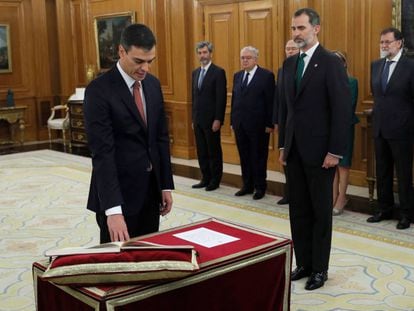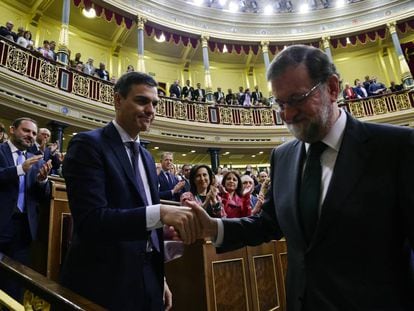How an unlikely no-confidence motion was won in Spain
In eight days of talks and negotiations, Socialist leader Pedro Sánchez was able to unseat Mariano Rajoy
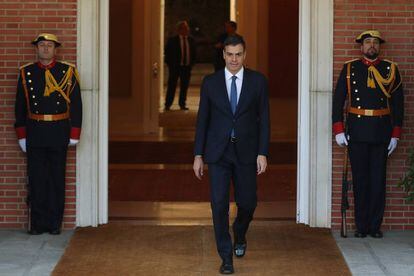

The worst week in the long political life of Mariano Rajoy began with a party. It was a Wednesday; the skies over Madrid were dark, presaging a storm, and the Spanish prime minister was tired but elated. At the eleventh hour, faithful to his resist-to-the-end style, he had managed to push through the budget plan with support from Ciudadanos and the Basque Nationalist Party (PNV).
In theory, this should have given him two more years of respite. All the MPs had gone home, but Rajoy was still inside Congress, celebrating with his team.
Only eight days later, Rajoy found himself sitting inside another restaurant with practically all the same aides save for his deputy Soraya Sáenz de Santamaría. But the occasion was no longer a party – rather, it was more like a political funeral. He spent eight hours inside this restaurant, missing out on the afternoon session of a crucial congressional debate that would end with the decision to vote him out of office.
The image of a disoriented Rajoy emerging from the restaurant made news inside and outside of Spain. It was a very different picture from the one he’d been planning to portray at the close of 35 years in politics. So what happened during those eight days that changed everything?
Right now, secessionism worries me a lot more than whatever the PP may have stolen Extremadura premier Juan Carlos Rodríguez Ibarra
It all began two Thursdays ago, not even 12 hours after the budget victory. Pedro Sánchez, secretary general of the Socialist Party (PSOE) and leader of the opposition, was giving a radio interview on Cadena SER. Afterwards, he mentioned plans to be in Portugal on Friday for a Socialist convention. Reporters reminded him that the ruling in the main Gürtel trial was about to come out, and that it could be a bombshell.
Only an hour later, the verdict in the sprawling kickbacks-for-contracts case came out, and it was indeed a bombshell – not just because of the 29 convictions, including 33 years in prison for Luis Bárcenas, the former PP treasurer whom Rajoy personally defended until the last minute. It was also because the judges found solid evidence that the PP itself engaged in illegal financing for years, and even questioned the credibility of Rajoy’s testimony.
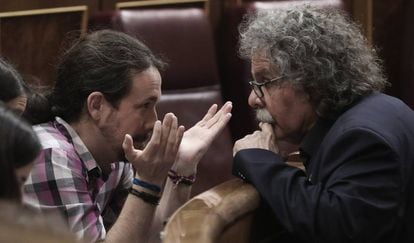
“Credibility is granted by citizens at the polls,” said Rajoy the following day. The PM followed his usual routine: act casual and wait for the storm to pass. Except this time, it didn’t pass.
Sánchez, the Socialist leader, immediately called his closest aides to analyze the Gürtel ruling together. Iván Redondo, the star advisor in the team and a fan of chess, joined the team to define the next move. They waited a few hours to see what the PP would do. In the absence of any action, the Socialists decided to make their move against Rajoy.
Sánchez telephoned a great many people but none of his internal rivals, such as Andalusian premier Susana Díaz, who fought him for the position of secretary general in May of last year. By ignoring them, Sánchez showed that he no longer needed them to make decisions.
Before this, Sánchez had repeatedly ruled out the idea of filing a no-confidence motion because that would mean asking the Catalan separatists for support. But this time was different.
Gürtel changes everything
The ruling changed everything. The media unveiled a wealth of details about the case, and the scandal started growing by the minute. Some Socialist leaders were more nervous than others, but everyone agreed that there was no choice but to file a no-confidence motion. Margarita Robles, the party’s congressional speaker, drafted the text and it was quickly tabled the next day, even before the meeting of the party’s executive committee. Sánchez wanted to move fast while Rajoy continued to stand still.
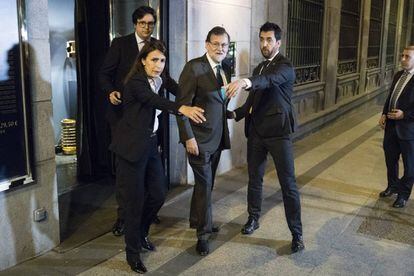
Rajoy, as always, was convinced that he would weather the storm. Podemos leader Pablo Iglesias pledged to support the motion, but Ciudadanos, the fourth-largest force in parliament, said no – it wanted a snap election, but not with Sánchez already sitting in the prime minister’s office.
At that point, it seemed impossible to get all the other smaller parties to agree. Some observers even concluded that Sánchez never meant to win the no-confidence vote in the first place, and that he was merely filing the motion to be seen as a strong opposition leader, now that Ciudadanos’ Albert Rivera seemed to be assuming that position. But those who know Sánchez well say that to think that is to not know the man at all.
On Friday, Sánchez phoned major Socialist figures who had opposed his own run for the party leadership, including former PMs Felipe González and José Luis Rodríguez Zapatero. But he called them after filing the motion, not before. The response he received from them was cold, as he’d been expecting.
Things were not looking good that weekend. By Sunday, the no-confidence motion was teetering on the brink of disaster. Quim Torra, the new Catalan premier, was demanding public pledges regarding the release of jailed politicians and the right to self-determination.
Even internally, some historic PSOE leaders were moving to undermine the motion. “Right now, secessionism worries me a lot more than whatever the PP may have stolen,” said Extremadura premier Juan Carlos Rodríguez Ibarra. And PNV leader Andoni Ortuzar called the motion “undercooked.” Failure seemed certain.
In the end, it was all down to the Basque nationalists
But things started to change last Monday. High-ranking officials within the PDeCAT talked to their leader, the ousted Catalan premier Carles Puigdemont, to convince him to vote to oust Rajoy (he had originally favored an abstention). Then, PDeCAT deputies in Congress began a series of talks with their Basque colleagues, asking one another: “So what are you going to do?”
At that point, the Basque nationalists were still planning to abstain. Their leader, Andoni Ortuzar, felt it would not be very consistent to support Rajoy’s budget one week and vote him out of office the next. And Basque business leaders were asking him not to do it. But the Catalan nationalists of PDeCAT said that they were going to vote against Rajoy, which would leave the PNV looking like Rajoy’s savior. And the PNV did not want to be seen this way.
Tuesday
The tide started to turn on Tuesday. High-placed PSOE figures began meeting with other parties: Compromís, the regional party from Valencia, whose support was easy to secure, then Ciudadanos. But the latter, who is leading voting intention surveys, had a different suggestion: scrap the Socialist motion, and file a joint PSOE-Ciudadanos motion with a historic Socialist figure such as José Borrell at the helm until new elections could be held. The Socialists offered to negotiate an election date if Ciudadanos would support Sánchez as the new PM. There was no deal.
Further meetings followed with the Catalan Republican Left (ERC), another separatist party whose representative in Congress, Joan Tardá, pledged to support the motion and urged caution in Sánchez’s speech about Catalonia.
And then Pablo Iglesias stepped in. The Podemos leader had been talking to everyone, as usual. And Iglesias contacted Ciudadanos leader Albert Rivera with an offer: if Sánchez’s motion were to fail, Podemos and Ciudadanos would file a joint one of their own with the sole intention of calling a snap election. In reality, this move was aimed at convincing the Basque nationalists to support Sánchez’s motion, because the last thing the PNV wants to see right now is an election victory by Ciudadanos, which has questioned the Basque Country’s special financial deal with Madrid.
Torra’s decision to replace them with “clean” candidates meant that Madrid could lift the emergency measures and restore self-rule to the region.
PSOE representative José Luis Ábalos met with the Basques, who had understood Iglesias’ move but refused to give away their vote so easily. First they demanded assurances that the recently passed budget – which contains hefty investments in the Basque region – would be left untouched if Sánchez became the new PM. They also requested new elections as soon as possible. And even then, they promised nothing.
On Tuesday afternoon, news emerged that the Catalan premier, Torra, was yielding and removing four controversial names from his preliminary cabinet list. The presence of fugitives from justice and individuals under criminal investigation for their role in the unilateral independence push had been blocking a new Catalan government. Torra’s decision to replace them with “clean” candidates meant that Madrid could lift the emergency measures and restore self-rule to the region. “This makes it easier for us,” a Socialist source admitted.
In the end, it was all down to the Basque nationalists. Rajoy phoned the PNV leader on Wednesday, but by then it was too late. The mood inside Congress was already one of doom and gloom in the PP seating area. Only the diehard Rajoy supporters still felt that the PM would emerge unscathed from this one.
Meanwhile, the PSOE and the Catalan parties negotiated what Sánchez should and should not say about Catalonia at the no-confidence debate to ensure a yes vote. On Thursday, inside Congress, Sánchez spoke of “dialogue,” of normalizing relations with the Torra administration, and of reviewing a few pieces of legislation struck down by Spain’s Constitutional Court. This was what the Catalan nationalists had wanted to hear. They announced their yes vote. So did the Basques.
Last meal
The die had been cast. At the Thursday morning debate, Sánchez urged Rajoy to resign and walk out on his own terms. Sánchez knew for a fact that Rajoy would never do such a thing, but it made him look good: critics would no longer be able to say that he, Sánchez, wanted power at any cost. But Rajoy just walked away and never returned from his lunch break, choosing instead to spend the afternoon at a nearby restaurant, Arahy, while his fate was being sealed.
Sánchez urged Rajoy to resign and walk out on his own terms
When news of the PNV’s support came through, Rajoy told his aides that nothing would be gained by resigning; that Sánchez would end up in his post anyway with the same support, or that it would trigger instability through a snap election of unpredictable results.
But his absence was duly noted in Congress. Taking Rajoy’s place in his seat was his deputy’s handbag, which quickly reached something like icon status. Podemos leader Pablo Iglesias screamed out: “It’s shameful that the prime minister’s seat is occupied by a handbag!”
On Friday morning, after another two-hour absence, Rajoy returned to Congress, took the podium, and seem to recover some of his old flair. In an elegant speech, he wished Sánchez the best and tried to leave on a positive note.
If I ever offended anyone, I apologize, I think that I lived up to my mandate, which was to improve people’s lives
Mariano Rajoy
“If I ever offended anyone, I apologize,” he said in humble tones. “I think that I lived up to my mandate, which was to improve people’s lives.” Outside the building, half a dozen people cheered Rajoy as he left, to cries of “¡Presidente, presidente!” and a couple of “¡Viva España!”
After the vote, there were scenes of dejection in the PP area. Meanwhile, Sánchez went to celebrate his victory with his closest aides. Shy and impenetrable as always, he said nothing more than “How exciting!” before taking the elevator and leaving Congress. A new era had begun in the space of a week, against all odds.
English version by Susana Urra.
